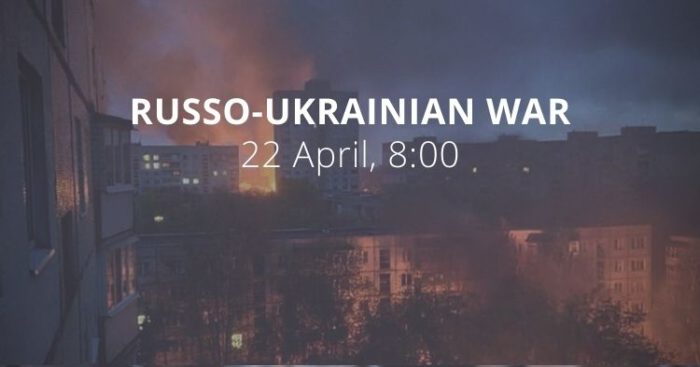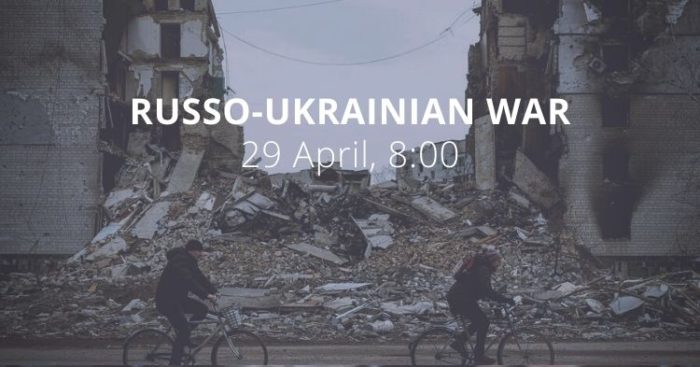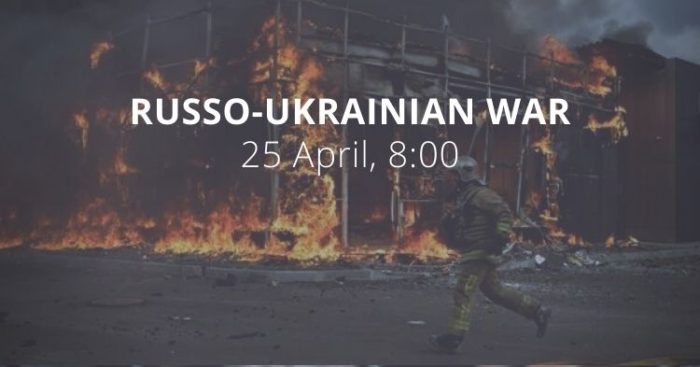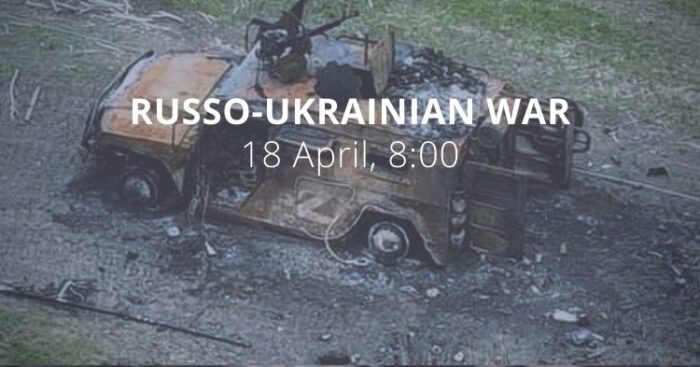Morning report day 58 – April 22
The report is based on media reports, expert analyses, and official information posted online.
Situation
According to information from the General Staff:
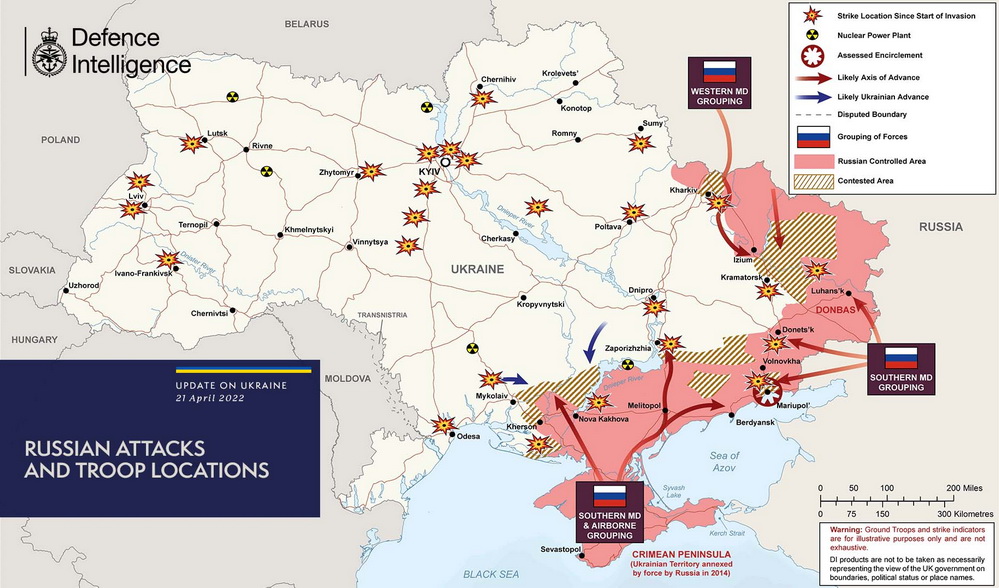
In the Volyn and Polissya directions, Russian forces did not take active action, and no signs of the formation of offensive groups were noted. Measures are being taken to strengthen the coverage of the state border in the western and north-western directions. The air defense forces have been transferred to reinforced duty. The protection of headquarters, communications centers, military camps, arsenals, bases, and warehouses for weapons, military equipment, and fuel and lubricants has been strengthened.
- There is a significant reduction in the intensity of the movement of columns of Russian military equipment on the territory of the Republic of Belarus. Some units of the Belarusian Armed Forces continue to carry out tasks to cover the Ukrainian-Belarusian border in Brest and Gomel oblasts.
In the Slobozhansky direction, Russian forces, with forces of up to seven battalion tactical groups from the 6th Combined Arms Army, coastal troops of the Baltic and Northern Fleets, continue to partially block the city of Kharkiv, firing on units of our troops and critical infrastructure.
- In the Izium direction, Russian forces concentrated up to 25 battalion tactical groups from the 1st Tankr Army, the 20th and 35th Combined Arms Armies, the 68th Army Corps of the Eastern Military District, and airborne troops of the Armed Forces of the Russian Federation.
- Russian forces are trying to launch an offensive in the direction of the settlement of Zavody. Russian forces went to the northern outskirts of Dibrovny, trying to gain a foothold on the frontier.
- In the temporarily occupied territory of Kharkiv Oblast, Russian occupying forces prohibit the movement of the local population towards the territory controlled by the Defense Forces of Ukraine, and the delivery of humanitarian aid from the Ukrainian side is blocked.
In the Donetsk and Tavriya directions, Russian occupiers intensified hostilities along the entire line of combat during the day. The Russian forces carried out assault operations in the area of the settlement of Zarichne and, with forces of the battalion, tries to advance in the area of the settlement of Rubizhne.
- Defensive battles with Russian forces continue in the direction of the settlements of Novtoshkivske and Popasna.
- Russian forces continue to try to support the artillery in the area of Marinka.
- At the same time, Russian forces strengthen the grouping of troops in the Zaporizhzhia direction. Measures for the logistical support of the occupying forces are underway.
At 13:30, another Russian missile hit Zaporizhia's island of Khortytsia, damaging the building of a health center of one of the city's enterprises. Eight people were injured.https://t.co/G5j4TdUCa8 pic.twitter.com/gI0MsD0yKx
— Euromaidan Press (@EuromaidanPress) April 21, 2022
- Russian forces tried to take full control of Mariupol. It continued to carry out airstrikes and attempted assaults in the area of the seaport and the Azovstal plant.
- Ten attacks by the Russian forces were repulsed in Donetsk and Luhansk oblasts over the past 24 hours, six tanks, eight armored units, fifteen vehicles, and four artillery systems were destroyed.
In the Pivdennyi Buh direction, the enemy continues to fire on units of the Defense Forces of Ukraine, tried to conduct reconnaissance by fighting in the Trudolyubivka area, suffered losses, and retreated to previously occupied positions.
- The shelling of Mykolayiv continues, Russian forces are trying to improve their tactical position and get closer to the city but have no success.
Fifteen air targets were destroyed by the Air Force of the Armed Forces of Ukraine, together with anti-aircraft gunners of the Land and Assault Forces, Marines, and the National Guard, on the previous day: nine UAVs, three planes, and three helicopters.”
The Russian Navy continues operating in the Black Sea, Operational Command South reports. It continues to block civilian shipping. The Black Sea Fleet conducts maritime surveillance, building a recognized maritime picture. It also searches the site where Russia's Black Sea flagship Moskva sank. (The navy might be searching for traces of radiation from the nuclear weapons the warship most probably was carrying, or simply searching for missing sailors - HPM).
The Armed Forces of Ukraine has killed a detachment of Libyans and Syrians in the Luhansk Oblast, Ukrainska Pravda reports citing the Secretary of the National Security and Defense Council, Oleksiy Danilov. He added that the detachment of about 20-25 people was completely wiped out. At the same time, he noted that it is currently difficult to estimate how many Russian mercenaries from other countries "are roaming the territory of Donetsk and Luhansk oblasts, which have been partially occupied since 2014." Danilov suggests that it is no more than about 300-500 people."
Ukrainian fighters hold on as Putin claims victory in Mariupol, the Reuters reports.
“Ukrainian fighters were clinging to their last redoubt in Mariupol on Friday after Russian President Vladimir Putin claimed victory in the biggest battle of the war, declaring the port city "liberated" following weeks of relentless bombardment. The United States, however, disputed Putin's claim and said it believed Ukrainian forces still held ground in the city. Putin ordered his troops to blockade a giant steelworks where the Ukrainians are holding out, having refused an ultimatum to surrender or die.”
85% of Russian equipment has been taken out of Belarus, Ukrainska Pravda reports. Belarusian journalists claim that the Russian occupiers removed 85% of the military equipment from the territory of Belarus, which was recorded at the time of the retreat of Russian troops from the outskirts of Kyiv. “Currently, there are no military equipment and loading echelons at the railway stations in Osipovichi, Kolodishi, Khoiniki, Rechitsa, Kalinkovichi, and Kozenka (Mozyr).
Ukrainian General Staff has reported on the Russian manning and logistic challenges:
- Russian forces continue to suffer losses. According to the available information, on April 20 this year, another consignment of wounded servicemen of the Armed Forces of the Russian Federation (about 220 people) and more than 50 bodies of the killed invaders were taken to the central district hospital of Novoaydar.
- In addition, the battalion tactical group of the 136th Separate Motorized Rifle Brigade of the 58th Combined Arms Army of the Southern Military District, operating in the Kurakhiv area, suffered significant casualties (up to 250 men) and lost up to 10 rocket and artillery.
- Also, according to available information, the personnel of the 150th Motorized Rifle Division of the 8th Guards Combined Arms Army of the Southern Military District, which was involved in hostilities on the territory of Ukraine, did not receive the so-called "combat" funds for March. Because of this, the servicemen express their dissatisfaction and indignation.
- In order to prevent the disruption of the spring conscription campaign in the temporarily occupied territory of the Autonomous Republic of Crimea from April 30 this year, Russian occupiers will be banned from leaving and entering the peninsula.
- In the temporarily occupied territory of the Kherson oblast, the self-proclaimed occupation authorities announced the mobilization of males. In addition, according to available information, a so-called "referendum" is planned for May 1 in the Russian-occupied part of the Kherson oblast. And in the period May 2-10, there is planned to be a "census". Locals are prohibited from moving between settlements.
- Russian forces continue to suffer significant losses in personnel and military equipment. According to updated data, the commander of the First Motorized Rifle Regiment of the Second Motorized Rifle Division of the First Tank Army of the Western Military District, Lieutenant Colonel Denis Mezhuyev, was eliminated by the defenders of Ukraine. Two members of the leadership of the same unit, Colonel Kharitonov and Lieutenant Colonel Smirnov, were also seriously injured and are being treated in Moscow.
- In addition, the soldiers of Russian units are significantly demoralized by the forced mobilization in unrecognized territorial formations of Donetsk and Luhansk oblasts, poor nutrition, and low financial and material support to the personnel who arrived to replenish regular units of the Russian Federation.
According to British Defense Intelligence, (last 24 hours):
- Putin's decision to blockade the Azovstal steel plant likely indicates a desire to contain Ukrainian resistance in Mariupol and free up Russian forces to be deployed elsewhere in eastern Ukraine. A full-ground assault by Russia on the plant would likely incur significant Russian casualties, further decreasing their overall combat effectiveness.
- In the eastern Donbas, heavy shelling and fighting continue as Russia seeks to advance further towards settlements including Krasnyy Lyman, Buhayikva, Barvinkove, Lyman, and Popasna as part of their plans for the region.
- Despite Russia's renewed focus, they are still suffering from losses sustained earlier in the conflict. In order to try and reconstitute their depleted forces, they have resorted to transiting inoperable equipment back to Russia for repair.
As of Friday 22.04.2022, the approximate losses of weapons and military equipment of the Russian Armed Forces from the beginning of the war to the present day: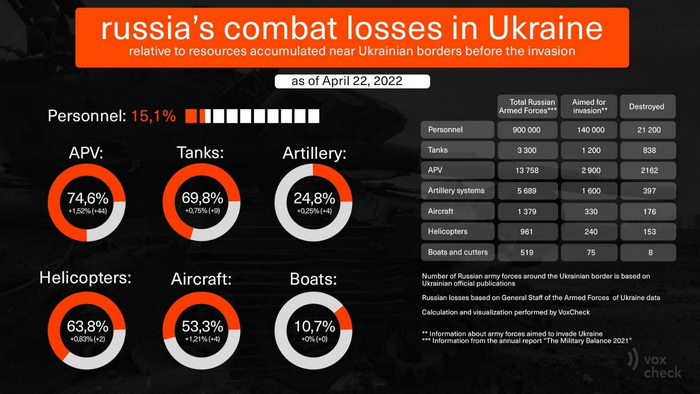
- Personnel – more than 21200 people (+200),
- Tanks – 838 units (+9),
- Armored combat vehicles – 2162 units (+44),
- Artillery systems – 397 (+4),
- Multiple rocket launchers – 138 (+2)
- Air defense means – 69 (+2),
- Aircraft - 176 (+4),
- Helicopters - 153 (+2),
- Automotive technology – 1523 (+15),
- Vessels/boats - 8 units (no change),
- Fuel and lubricant tanks – 76 (no change),
- UAV operational and tactical level – 172 (+6)
- Special equipment – 27 no change)
- Mobile SRBM system – 4 (no change)
Humanitarian
Russian forces have isolated the captured settlements and threatened to shoot volunteers, the Defense Intelligence of Ukraine (DIU) claims. They completely isolate the occupied Ukrainian settlements, prohibit evacuations, and do not allow volunteers. All occupied settlements of the Velykoburlutskyi district, Kharkiv Oblast are blocked today. Departure is possible only in the direction of the territory of the Russian Federation.
“There is an absolute ban on the delivery of humanitarian goods from the territory controlled by Ukraine. Locals have been warned that volunteers trying to deliver help are being shot. It recently became known about the shooting of volunteers travelling from Shevchenkove.
As of April 20, there is no mobile connection in the area. Many settlements were left without electricity. ATMs do not work, and products are sold at significantly inflated prices. There is no medical care or supply of medicines. Roads, including dirt roads, are changing.”
Meet 8y.o. Arseniy from Saltivka, a raion (district) of Kharkiv that was devastated by Russian bombs and missiles.
Some weeks ago, Arseniy donated 3,000UAH of his own savings to the Come Back Alive fund.
Be like Arseniy and #StandWithUkraine!https://t.co/qA07X16iXD pic.twitter.com/fs8CvJqbUp— Euromaidan Press (@EuromaidanPress) April 22, 2022
More than 7.7M Ukrainians forced to flee their homes since the Russian invasion began, the International Organization for Migration (IOM) said on Thursday, Ukrinform reports, referring to Reuters. This number totals 17% of the population of Ukraine. More than 600,000 additional people were internally displaced in Ukraine in the first 17 days of April. The new assessment conducted between April 11 and 17 showed that women represent at least 60% of those who leave the country because of hostilities. It is also noted that more than half of internally displaced persons - mainly in the east of Ukraine - reported a lack of some food products.
According to UNHCR 5,085,360 refugees have been registered as of 20 April. The UN says that so far Poland has taken in 2,847,540 refugees, Romania 763,769, Russian Federation 563,266, Hungary 476,213, Republic of Moldova 428,577 Slovakia 346,175, and Belarus 23,900. Among those who fled Ukraine are also Ukrainian nationals with dual citizenship. An additional 113,000 people moved to the Russian Federation from the Donetsk and Luhansk oblasts between 21 and 23 February.
More than 1 million Ukrainians returned to the country since the beginning of the full-fledged war as of April 18, a spokesman of the State Border Service of Ukraine said. Also, the State Border Service anticipates an increase of people returning to Ukraine amid the Easter holidays.
OHCHR recorded 5,264 civilian casualties in Ukraine as of midnight on 20 April: 2,345 were killed (including 177 children) and 2,919 injured (including 285 children).
Humanitarian corridors operated with a focus on the evacuation of women, children, and the elderly from Mariupol as of the evening of 21 April. According to the Deputy Prime Minister and Minister of Reintegration of Temporarily Occupied Territories of Ukraine:
“No good news about evacuation from Mariupol. Everything is going very hard. From the Russian side, everything is very complicated, chaotic, slowly, and of course, dishonest. However, the fact that yesterday people travelled from Mariupol to Zaporizhzhia for the first time directly (four buses left Mariupol yesterday) gives hope.”
As of April 22 am, Deputy Prime Minister reports that due to the high level of threats and insecurities along the humanitarian corridors, the evacuation effort will not be executed.
Legal
Russian occupiers bury killed Mariupol residents in the village of Mangush en masse, Ukrainska Pravda reports. "Mariupol. Right now. War crimes. As a result of a long search and identification of places of mass burial of dead Mariupol residents, we established the fact of mass burial of dead Mariupol residents in the village of Mangush, Petro Andryushchenko, the Adviser to the Mayor of Mariupol wrote on Telegram. Russian occupiers have built several mass graves up to 30 meters in size each in the area of the bypass road, and the bodies of the dead are being transported there by trucks, in fact simply dumping them."
The Defense Intelligence of Ukraine (DIU) has published a list of servicemen belonging to the command staff of the 79th rocket-artillery brigade (military unit 53956, Tver) of the Western Military District of the RF Armed Forces. They are directly involved in an open military invasion of Ukraine. The personnel of the brigade was involved in targeted artillery shelling from heavy weapons of settlements in the Sumy and Kharkiv oblast, which led to significant casualties among the civilian population. DIU promise that all war criminals will be brought to justice and will be held accountable.
The General Staff of Ukraine claims that in the temporarily occupied territories, enemy units continue to block the movement of local people, looting and artificially approaching the humanitarian crisis - destroying critical infrastructure and blocking the delivery of humanitarian goods from Ukraine. There have been cases of executions of civilians and volunteers.
208 children were killed, and 386 children injured, the Office of the Prosecutor General of Ukraine reports as of 8 a.m. on April 22.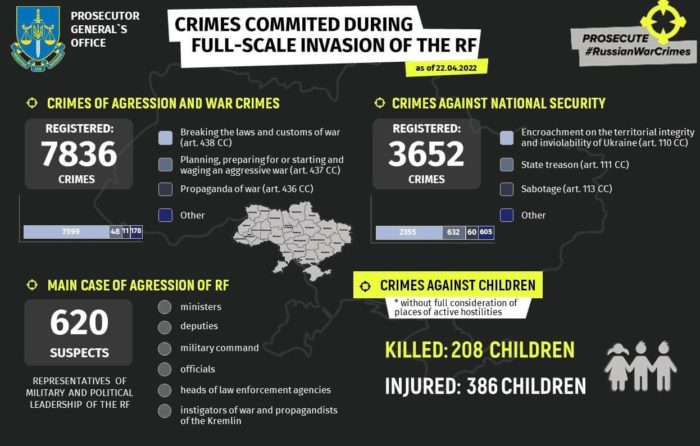
1141 educational establishments are damaged as a result of shelling and bombings, 99 of them are destroyed fully. 7836 crimes of aggression and war crimes and 3652 crimes against national security were registered.
The US helping collect evidence of possible war crimes in Ukraine, the Reuters reports. The United States has been in contact with Ukraine's prosecutor and is assisting with the preservation and collection of evidence of war crimes committed by Russia, US Attorney General Merrick Garland said on Thursday.
Environment
President Zelenskyy yesterday addressed the World Bank ministerial roundtable in support of Ukraine. He used the opportunity to highlight the scale and consequences of the Russian atrocities. “Due to the bombing and shelling by Russian troops in Ukraine, 1,141 educational institutions have been destroyed or damaged. Schools, kindergartens, universities. All over our country!… And if so many educational institutions were destroyed, you can imagine how much else was destroyed. Hospitals, infrastructure, businesses, and ordinary houses. The Russian invasion destroyed normal economic relations. The first loss analysis alone yielded approximately $ 550 billion in losses.
Russia has blocked our ports in the Black Sea and the Sea of Azov. This has significantly reduced Ukrainian exports, including agricultural products. Due to the shortage of Ukrainian food on the world market, the beginning of the crisis is already being felt. A recent report by the UN World Food Program stated that rising food prices this year would lead to starvation of about 47 million people in 81 countries.
Without Ukrainian wheat, corn, vegetable oil and other commodities, this will result not only in physical food shortages in many countries in Africa and Asia but also in political instability and possibly a new migration crisis. People will look for the culprits of this crisis, in particular, taking to the squares in their countries, in their cities. People will look for ways to escape.
Of course, we do our best to export our products. We launched a sowing campaign this year - as much as possible. But no one in the world can be sure that food security can be guaranteed as long as this war continues - Russia's war on our land. Stopping the war now and liberating our territory from Russian invaders is the only reliable way to stop the food crisis.
The Russian troops are deliberately destroying all facilities in our country that could provide an economic basis for life. Railway stations, food warehouses, bakery plants, oil terminals, etc... As of now, given the economic downturn and broken economic ties, we need up to $ 7 billion in financial support each month. Ukraine will need hundreds of billions of dollars to recover from this war. …
Russia is accompanying this war against us with aggressive measures on world markets. They specifically create such conditions that there is instability not only in the food market but also in the fuel market and the raw materials markets in general.
Russia has provoked rising energy prices in Europe and more broadly in the democratic world. With sufficient export potential, they have constantly held back gas, in particular, to create painful price conditions for European consumers. So that people put pressure on their governments in the middle of the state for the sake of Russia's political interests.”
President Zelenskyy described many of the features of the Hybrid War that Russia has waged against both Ukraine, the EU, NATO, and the USA for more than a decade already, but which the West until recently has failed to acknowledge. President Zelenskyy made the case for the following global steps:
- Immediate support for Ukraine, so that the Russian leadership knows that the war will not allow them to realize any of their aggressive goals.
- Russia must be immediately excluded from all international financial institutions.
- A special tax for the war was imposed on all trade transactions with Russia and with Russian companies. Funds from the war tax should be used to help Ukraine rebuild everything that Russia destroyed in the war.
- Every country in the world needs to prepare now for the possible complete severance of any relations with Russia. No one should depend on the political mood of the leadership of this state. If the world is ready to isolate Russia completely, the Russian leadership will have a motive to avoid any war.
- The blocking of Russian assets must be continued. Russia's blocked funds must be used both to rebuild Ukraine after the war and to compensate for the damage that Russia has caused to other nations with its destructive behavior.
Support
Defense Secretary Austin to host Ukraine aid summit in Germany, the Washington Post reports.
“Defense Secretary Lloyd Austin will host a summit in Germany next week to build support for Ukraine’s defense and security needs, the Pentagon’s top spokesman, John Kirby, said Thursday.
The “Ukraine Defense Consultative Group,” which will meet at Ramstein Air Base in Germany on Tuesday, has the markings of a donors conference. But Kirby said its ambitions are broader, and that the group will focus not just on Ukraine’s short-term military assistance needs and the latest battlefield assessments, but also take “a longer, larger view of Ukraine’s defense needs, going forward beyond the war that they’re facing right now.” …
It is not yet clear exactly which nations have been invited to take part in the discussion or have accepted the invitation. Kirby said the developing list of invitees includes both NATO allies and other countries outside NATO.”
Biden announces a new $800M aid package to Ukraine as Russia presses offensive, the ABC news reports. President Joe Biden on Thursday announced an additional $800 million package in military assistance to Ukraine, as well as a ban on all Russian-affiliated ships from US ports.
The United States will send an additional 500 million dollars in direct economic assistance to Ukraine as its military fights off a renewed Russian assault, President Joe Biden said Thursday, CNBC reports. “This is money the government can use to stabilize their economy. The latest security package, the eighth such installment, includes 72 howitzers, 144,000 artillery rounds, 72 tactical vehicles to tow howitzers, and more than 121 Phoenix Ghost tactical drones. The first rounds of that equipment will be in the Ukrainian hands by the end of the weekend,” an official said.
Biden said the new assistance will expend most of the remaining funds available for this purpose and that he will make a supplemental funding request to Congress next week. He said the amount is being discussed, Reuters reports.
The Sun reported 18 Apr that UK would send Stormer launch vehicles to Ukraine to augment the effectiveness of Starstreak anti-air missile systems
Stormers' sensors and fire control system make them substantially deadlier to low-flying Russian aircrafthttps://t.co/YwhFQDK2aC pic.twitter.com/xvsMMTNZvN
— Euromaidan Press (@EuromaidanPress) April 22, 2022
Germany agrees on heavy weapons for Ukraine with the EU and NATO, the European Truth reports. Germany is negotiating with the EU and NATO, which could provide Ukraine with heavy Soviet-made weapons. This was stated by Defense Minister Christine Lambrecht. Lambrecht has made it clear that Germany cannot supply Ukraine with heavy weapons from the Bundeswehr's reserves, so negotiations are underway with EU and NATO partners. Countries that provide heavy weapons to Ukraine will later have these replaced by German industry.
"We are talking about tanks, armored personnel carriers, various options that can be provided by individual countries. We are currently negotiating, and now it is happening very quickly," Lambrecht said. Asked when Ukraine will receive these heavy weapons, Lambrecht said: "We are talking about the coming days. All military experts are confident that the next two weeks will be decisive in Ukraine's struggle with Russia, and we must support this struggle."
Slovenia sending tanks to Ukraine in weapons swap with Germany, Total Slovenia News reports. The German news agency DPA has reported that Germany has agreed to send heavy weapons to Ukraine with several other European countries, including Slovenia, which is to send its T-72 tanks to Ukraine in return for tanks and armored personnel carriers (APCs) from Germany's own stock. The Slovenian Army has 54 M-84 tanks in its fleet. The M-84 is a Yugoslav third-generation main battle tank, a variant of the Soviet T-72.
Denmark allocates $90M for weapons for Ukraine, Ukrinform reports. "Today, I would like to inform you, Mr. President, of new significant contributions, including almost 600 million Danish kroner, or almost 90 million US dollars, for weapons. This makes the total Danish military contribution more than 1 billion kroner about 146 million US dollars," Prime Minister of Denmark Mette Frederiksen said at a joint briefing with Prime Minister of Spain Pedro Sánchez and President of Ukraine Volodymyr Zelenskyy in Kyiv. Denmark’s assistance will also include the mine clearance.
The UK Government announces further trade sanctions against Russia – expanding the list of products facing import bans and increasing tariffs, according to a press release. The UK Government has announced further trade sanctions against Russia – expanding the list of products facing import bans and increasing tariffs. With these new measures, the UK will now be imposing import tariffs and bans on over £1bn of Russian goods.
New developments
- Ukrainian Parliament extends martial law, Ukrainska Pravda reports. The Verkhovna Rada (Parliament - ed.) of Ukraine met on 21 April and extended martial law over the entire territory of the country for another month. MPs also voted on dismissing the recently apprehended Viktor Medvedchuk, a pro-Russian politician and close friend of Putin’s accused of treason, from his position in a parliamentary committee. Martial law was extended from 5:30 am on 25 April for another 30 days.
- Zelenskyy met with Sanchez and Frederiksen in Kyiv, Ukrinform reports. President of Ukraine Volodymyr Zelenskyy met with Spanish Prime Minister Pedro Sanchez and Danish Prime Minister Mette Frederiksen in Kyiv on Thursday. The Spanish Prime Minister and Danish Prime Minister also visited Borodianka, the Kyiv oblast, which was hit particularly hard by Russian attacks.
- President Zelenskyy addressed the World Bank ministerial roundtable in support of Ukraine. He outlined the scale of its destructions and the global consequences. President Zelenskyy called for further actions to curb the Russian aggressions, ensure global food security and force it to pay for war damage.
- Russia to secure the nuclear-free, neutral status of Ukraine, TASS reports. Russia’s so-called special military operation in Ukraine is aimed at “demilitarization and denazification” of the country, and Moscow will “ensure that the country has a non-nuclear and neutral status”, the Russian Ambassador to the US Anatoly Antonov said on Thursday. The diplomat slammed the recent decision by the Organization of American States (OAS) to suspend Russia’s observer status over the situation in Ukraine as a part of a "deliberate campaign to isolate Russia on international platforms." "We are being punished for firmly defending our legitimate national interests and refusing to bend to others’ will," he said. (His statement both indicates that Russia has not yet changed its overall aim of the war but that the sanctions and restrictive measures have started to hurt - HPM).
- Israeli envoy to Russia: Would be an ‘honor’ to host Putin-Zelenskyy talks in Jerusalem, The Times of Israel reports. Ambassador Alexander Ben Zvi stresses that any decision on such a meeting is up to the two leaders and says Bennett and the Russian president are ‘in regular contact’. Ben Zvi floated the possibility that Israel could alternatively host delegations from Kyiv and Moscow that do not include their respective leaders. “What was done in Türkiye can also be done in our country,” he said, noting talks that took place between representatives of the warring nations in Istanbul last month.
Assessment
On the War
The Institute for the Study of War has made the following assessment as of Thursday 21 April:
"An order to destroy and purge Mariupol is fulfilled," the Chechen unit reported straight as it is, staying on the background of the burning city. Chechens became "famous" for their Tik-Tok videos although little was known about their real achievements in the battle. https://t.co/P0pTTBOgRU — Euromaidan Press (@EuromaidanPress) April 21, 2022 The Kremlin’s reduction of the pace of operations in Mariupol is unlikely to enable the deployment of significant combat power to support other offensive operations in the coming days and weeks. Statements from US officials that Russia has not yet removed a dozen battalion tactical groups (BTGs) from Mariupol despite Putin’s claimed victory does not capture either the status of these Russian forces or other constraints on their use. ISW has consistently assessed that Russian BTGs have taken high casualties in the battle of Mariupol, are degraded, and are unlikely to possess their full complement of personnel (800-900 at full strength). As with Russian operations elsewhere in Ukraine, reporting on numbers of BTGs without additional context and analysis of the combat power of these units is not a useful evaluation of Russian forces. While it is unlikely that all 12 reported BTGs were involved in the final fighting around the Azovstal plant, it will still take some time for those units that were engaged in final assaults to disengage for redeployment elsewhere. Some portion of these Russian forces will be necessary for several other missions—including maintaining the siege of the Azovstal plant, securing the rest of Mariupol against any remaining pockets of Ukrainian forces and likely partisan actions, and possibly redeploying to support Russian forces maintaining control of southern Ukraine.
Russian forces continued offensive operations in eastern Ukraine but made only marginal gains on April 21. Russian forces continued to focus their assaults on Rubizhne, Sievierodonetsk, and Popasna and likely made local advances in Rubizhne, though Russian claims to have captured the entirety of Rubizhne are likely false. The Ukrainian governor of Luhansk Oblast reported on April 21 that Russian forces control approximately half of Popasna, and street fighting is continuing across the city. The Russian Ministry of Defense additionally claimed to capture Kreminna, west of Rubizhne, but ISW cannot verify this claim. Russian forces are continuing to deploy reinforcements to eastern Ukraine to support further offensive actions.
Russian forces continued assaults on Ukrainian positions around Izium but did not secure any territorial gains in the past 24 hours. Russian forces may be attempting to probe Ukrainian defensive positions around Izium before larger offensive operations but remain largely road-bound and unlikely to secure any major breakthroughs.
Key Takeaways
- The Kremlin’s declaration of victory in Mariupol is unlikely to enable the deployment of significant combat power to reinforce offensive operations in eastern Ukraine in the coming days or weeks.
- Russian forces involved in the battle of Mariupol are likely heavily damaged and Ukrainian forces succeeded in tying down and degrading a substantial Russian force.
- Russian forces continued offensive operations in eastern Ukraine but made only marginal gains.
- Ukrainian forces continued to halt Russian attacks around Izium.“ [/box]
Consequences and what to do?
In the article “The West needs to send Ukraine more and better weapons” the Economist stresses that the next phase of the war may be harder—and just as important.
The battle of Kyiv may be over, at least for now, but the battle of Donbas is becoming more intense. On April 18th Ukraine’s government reported a wave of attacks along a 400km stretch of the front lines, mostly in the Donbas region, parts of which have been under the control of Russian-backed separatists since 2014. Vladimir Putin wants to grab the rest of Donbas, along with other bits of southern and eastern Ukraine. That may not sound as important as the siege of Kyiv, but the consequences of a Russian victory would be almost as bad.
Mr. Putin has little to show for his war so far, which has succeeded mainly in killing civilians, mangling his forces, and leveling much of eastern Ukraine. The loss of an untold number of Russian soldiers (more than 20,000, according to the Ukrainians), eight generals, and the flagship of Russia’s Black Sea Fleet, the Moskva, has been humiliating. If the latest push makes headway, Russia’s dictator can claim vindication, while Ukraine will be left divided and disheartened. Russia might then choose to press its advantage, or simply “freeze” the conflict, leaving a devastated Ukraine to slide into dysfunction. Either way, Mr. Putin would have prevented Ukraine from becoming the prosperous, pro-Western rebuke to his own rule that he so clearly fears.
It would be rash to assume that Russian forces will be as incompetent in the east as they previously were in the north, around the capital. For a start, they are now attacking from their home territory, not the temporary positions in Belarus they had taken up under the pretense of conducting “exercises”. Their supply lines will be shorter. And they will seek to fight on relatively open terrain where, in contrast to the forests around Kyiv, it will be easier for the invaders to spread out and harder for the defenders to ambush them.
Ukraine needs more help. The Western response so far, particularly that of America, has been remarkable. A steady flow of weapons, especially portable anti-tank and anti-aircraft missiles, made a huge difference in the defense of Kyiv. But to hold the Russians back along a long front, let alone force them to retreat from the territory seized since the war began on February 24th, will take heavier weapons too: tanks, planes, artillery, and an abundant supply of ammunition to go with them.
This is not a simple matter. Ukrainian forces use mainly Soviet-era weaponry. In the short term, they need more of it: things like mi g fighter jets and t-72 tanks, as well as s-300 missiles and Gvozdika howitzers. NATO countries that used to be Soviet satellites, such as the Czech Republic, Poland, and Slovakia, have stocks of such kit and have given Ukraine some of it. They should hand over more. But it will soon run out, and cannot be replenished, so the West needs to start supplying the more modern armaments used by most NATO countries and training Ukrainian soldiers to use them. This week America, Britain, and Canada said they would provide Ukraine with heavy artillery—a step in the right direction.
The good news is that NATO’s supply lines into Ukraine, mainly from Poland, are now well established. So far, Russia has not found an effective way to disrupt them. If the weapons continue to flow and the war grinds on, Russia’s economy, only around the size of Spain’s even before the war began and economic sanctions were imposed, will not be able to keep supplying weapons on the same scale that NATO can. If Mr. Putin is to be defeated, and Ukraine is allowed to determine its future, it is not just the Ukrainian soldiers in Donbas, currently being pummelled by Russian jets, missiles, and artillery, who will have to keep their nerve. NATO must be steadfast, too.
Assessment by Hans Petter Midttun
The news that Defense Secretary Lloyd Austin will host a summit in Germany next week to build support for Ukraine’s defense and security needs, is potentially a game-changer. Maybe.
Firstly, the ambiguity on the invite indicates that not all of NATO will be invited. This is potentially the first indication of the formation of a “coalition of the willing” allowing for a broader military engagement in Ukraine. By hosting a meeting without NATO's weakest links, the USA and its partners will no longer be restricted by NATO consensus. They can do more.
Secondly, the conference might potentially address some of the structural and logistical challenges the Alliance is likely facing two months into the full-scale invasion (and 8 years after the war started). I remain convinced the Alliance (or even more likely, a coalition of the willing) will be forced to intervene in Ukraine at one stage. NATO has just not realized it yet, or worse still, it might have made the realization but is unable to act upon it as an Alliance.
The arguments in favor of a humanitarian intervention include – if we look beyond the fact that it is the right thing to do and very much in the spirit of the UN charter – include (1) the provisions laid down in NATO’s strategic concept and therefore, the Alliance credibility; (2) the escalating costs (in all meanings of the word) to both Ukraine and the world; (3) logistic challenges as NATO is slowly running out of “quick fix weapon supplies” and will inevitably be forced to either step back or do more; and (4) the recognition that a Ukrainian defeat is also a NATO defeat. The Alliance will lose all credibility for not being able to stop a nation whose GDP is the size of Canada.
But most of all, (5) at this stage many NATO countries will have finally recognized that another “Minsk Agreement Peace” (2014-22) will not secure peace in either Ukraine or Europe. Peace is only possible if Russia is evicted. This requires far more than simply supporting Ukraine’s efforts to defend itself.
Thirdly, a conference that discusses “a longer, larger view of Ukraine’s defense needs, going forward beyond the war that they’re facing right now”, will ultimately address the Ukrainian ask for Security Guarantors. In my opinion, this is not necessarily linked to the so-called Russian “peace negotiations” and demands. This might be addressing the unwillingness of some NATO members to accept Ukraine into the Alliance, creating the basis for a new regional defense pact.
In my humble opinion, Ukraine has proven itself a more worthy defender of Western values and principles than many of the NATO member states. As previously argued, we should not ask Ukraine to join NATO – NATO should ask for a Membership Action Plan to join Ukraine. Many countries would fall short of the requirements needed.
I have been asked how long will the war last? The answer might potentially depend on the outcome of the US conference next week.
Ukraine has fought for 8 years already and will continue fighting for as long as it takes because they don’t have any other options. They are defending their right to exist and right to choose their own governance and alliances.
For Russia, having made the biggest strategic blunder in its history, this has turned into a “now or never again” moment. If defeated in Ukraine, its global ambitions are forever lost. This becomes even more obvious when we consider the growing global effort to isolate and contain the Russian Federation to make sure it will never again be able to wage war. Russia will, therefore, continue fighting as long as it possibly can hoping for a “Minsk Agreement 3.0” and that the Western cohesion will falter, seeing it return to the same cynical foreign policy that allowed the hybrid war to escalate into a full-scale war in the first place.
At the end of the day, it is up to the West to decide how long the war will last. When NATO – or a Coalition of the Willing under the USA leadership – decides to intervene directly, the war will most likely end in weeks rather than months. The threat of a humanitarian intervention alone will likely force Russia to reconsider its war efforts. If it chooses to continue it runs the risk of seeing its military force being annihilated. Additionally, Russia – not the West – runs the risk of the “war spreading beyond Ukraine”.
What happens next depends on whether the West has taken President Zelenskyy’s call for courage to heart.

